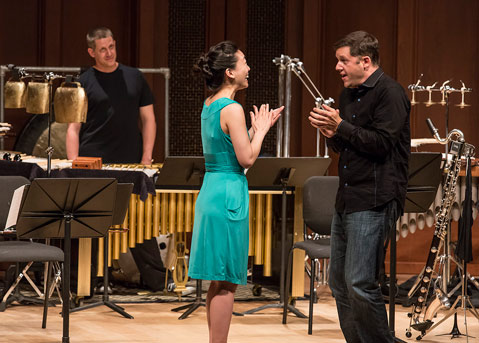Review: eighth blackbird at Hahn Hall
Music Academy of the West Hosted Contemporary Classical Group

Like the anticipation of a sunrise, the central focus of the Music Academy of the West (MAW) is always just ahead of the horizon — that is, the professional musician of tomorrow. While ensuring continuity with the past, the faculty and administration also leave windows open to the present moment: opportunities for young Summer Festival fellows to hear and meet the pros who are only a decade or two down the road. MAW patrons from 2013 will remember cellist Joshua Roman’s hip inauguration of new venues last year — curating at the Santa Barbara Museum of Art and performing an unforgettable solo set in a Funk Zone photo loft. This year, it was eighth blackbird who flew through that open window. The Chicago-based, Grammy-winning contemporary classical sextet was founded in 1996 and has made a name for itself playing new music. Indeed, the two sets performed at Hahn Hall, which displayed complex rhythmic finesse and theatrical flair, consisted entirely of new wine in new bottles, with no vintage older than 1982. New music is not everyone’s favorite cup — and as with wine, value becomes a function of age for many classicists — but the MAW does right by pointing to potential career routes outside of the symphony hall, and also by including imaginings from the front lines of musical invention.
The most entertaining work of the evening was Counting Duets, a sequence of four Études by György Ligeti (arranged for ensemble by blackbird flutist Tim Munro and pianist Lisa Kaplan) that interlocked with four of Tom Johnson’s spoken-word Counting Duets (1982). The Johnson pieces play out like a game, with two parts speaking entirely in numbers, contesting in dialogue, counting backward and forward, diverging and then coming together again in clockwork convergence. The Ligeti — notoriously beastly on keyboard — displayed new dimensions and marvels in these ensemble renditions. Duo for Heart and Breath by Richard Parry constituted the most intimate moment of the night, an experimental duet where pianist (Kaplan) monitored her heartbeat (via stethoscope) for tempo, while violist Yvonne Lam communed with her own breath. I had the vivid sense that others in the room, like me, were suddenly made aware of their own vital signs.
Intentionally written in lowercase, eighth blackbird gets its name from a Wallace Stevens poem, the eighth verse speaking of “noble accents and lucid, inescapable rhythms.” More than anything, one comes away from a blackbird performance impressed with the rhythmic textures — the weave, the palette, the broad plateau of churning patterns. Matthew Duvall’s versatile percussion helps this along, with metal and rosewood marimbas, kick bass drum, snare, and other devices. But at the root, the rhythm is in the writing, and every player, winds and strings included, helps the pulse along.



